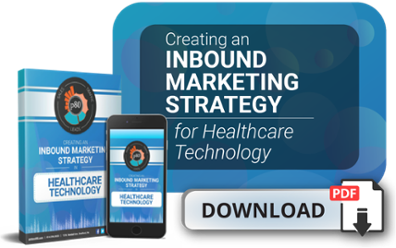Inbound Marketing Blog
for Manufacturers and Healthcare Companies
Medical Device Marketing Regulations: How to Be Legal & Effective

It takes a lot of time, effort, and brainpower to create an effective marketing strategy. And depending on your healthcare buyer persona, a lot of details can vary from product to product.
Medical device marketing has specific regulations that make those fine details even more important to understand.
It’s estimated that by 2025, global medical healthcare e-commerce will be over $435 billion. A lot of this is accredited to the digital boom that the industry underwent, making it even more essential to understand digital medical device marketing regulations.
Medical Device Marketing Regulations 101
Healthcare technology marketing regulations are the laws that surround the marketing of any medical device within the United States. They vary based on your location within the country, and are crucial to know as you plan out your marketing strategy.
All medical devices marketed in the U.S. are subject to the regulatory controls as part of the Federal Food, Drug, and Cosmetic Act (FD&C Act), along with the regulations in Title 21- Code of Federal Regulations (21 CFR).
To state it plainly: The government has put regulations in place to ensure that marketing pathways are not putting consumers at health risk.
3 Tips for Medical Device Marketing
There are many ways to devise a medical device marketing strategy, and your strategy should always be mindful of regulations and compliances. Here are three tips for medical device marketing best practices:
- Always consider medical device marketing regulations and compliance when strategizing
- Use research-backed information in your content marketing strategy
- Use ABM to achieve a smoother, more lucrative marketing process
1. Always Consider Medical Device Marketing Regulations and Compliance When Strategizing
This tip may sound like common sense, but are you accounting for regulations throughout the entirety of your marketing planning and implementation?
Make sure that you and your content creation team are aware of medical device marketing regulations for the specific region you’re marketing in. Every medical marketer, whether in the B2B or B2C industry, should be trained on compliance standards.
This includes more than just HIPAA, and can sometimes create obstacles in your marketing strategy.
For example, customer testimonials can be a great marketing tool because they create a supporting voice for your brand that your prospects may find trustworthy, or can relate with. However, this can cause concern in the B2C healthcare tech industry due to data security concerns. Rules are in place that prevent you from revealing a patient’s identity, along with other crucial information.
Failing to adhere to the regulations put in place can result in a fine of up to $50,000 per violation. So although medical device marketing regulations may cause unwanted stress during the strategy-creation process, it’s imperative that you study them closely and stay on the right side of the law.
2. Use Research-Backed Information in Your Content Marketing Strategy
Most companies marketing to a B2B buyer persona use blog posts as a key part of their marketing strategy. But did you know that less than 60% of healthcare marketers are blogging?
Not only does this present a big opportunity for a medical device marketing agency, but it also creates a unique sales funnel where prospects are further down the funnel by the time they first engage with your sales team.
Most medical buyers complete thorough research before making any purchasing decisions. Providing educational, research-backed content is a great way to connect with them. By the time they reach out to make contact with you, they’re leaning toward purchasing your product.
A research-backed content strategy can include:
- Case studies
- Product demos
- Clinical reports
- Explanatory videos
- References
Provide links to any crucial statistics that you provide, and don’t forget to incorporate storytelling into your content so that it’s not all just numbers and facts.
3. Use ABM to Achieve a Smoother, More Lucrative Marketing Process
ABM, or account-based marketing, is a marketing approach in which the marketing and sales teams work together to seek out and target specific high-opportunity accounts. It’s a relatively new process in the world of digital marketing.
Despite being new, ABM is a great way to increase the efficiency of your B2B medical marketing strategy. ABM allows you to prepare a wide variety of targeted content for your different personas. This can include personalized emails, videos, tech sheets, and so on.
This can be especially helpful before conducting a trade show, and can even be used in a PPC (pay-per-click) campaign. Since most trade show attendees, whether physical or virtual, likely used Google to find the trade show’s website, you can deliver targeted content directly to them.
When a prospect already knows about your brand and content prior to meeting in-person, it puts your sales team ahead of the competition.
Marketing Your Medical Device
Now that you understand the importance of medical device marketing regulations, and have received some tips for marketing your medical device, adapt your process throughout the entirety of your marketing campaigns. This includes all steps between strategizing and implementing.
An easy way to cover your bases is to have a planned-out calendar of marketing activities that reach your audience at all stages of their buyer’s journey. To learn how to create an inbound marketing strategy for the healthcare tech industry, simply click below to gain access to our free guide:
Our Blogs, Direct to Your Inbox!
How to Audit your Online Marketing
If you are executing digital marketing, congratulations! You are most likely already one step ahead of your competition, and making strides to meaningfully connect with prospects online. But, how do you know if you’re seeing continual success year over year, and improving your metrics?
Without the tools in place to analyze and benchmark your efforts, it is impossible to scale your online marketing and ensure continuous success.


